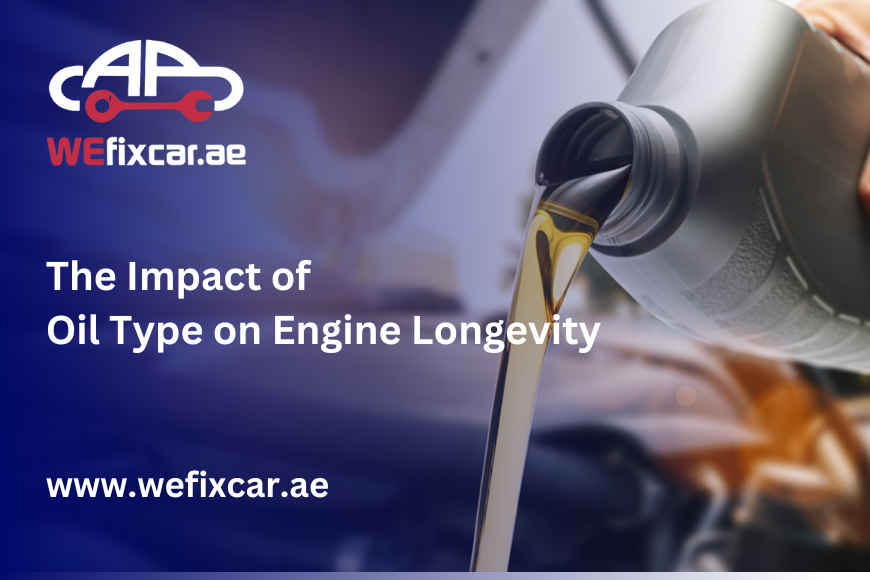When it comes to engine longevity, the type of oil you use plays a crucial role in how well your car performs over time. Engine oil is essential not only for lubrication but also for reducing friction, dissipating heat, and preventing wear and tear on critical engine components. But did you know that the type of oil you choose can significantly affect your engine’s health and lifespan?
In this blog, we’ll explore how the oil type—whether it’s synthetic oil or conventional oil—impacts your engine’s performance. We’ll also dive into key factors such as viscosity levels, the importance of regular oil changes, and how friction reduction can improve your car’s overall engine longevity.
What is Engine Oil, and Why Is It Important?
Before we explore how the type of oil affects engine longevity, let’s first understand the role of engine oil. At its core, engine oil serves the following functions:
- Lubrication: It reduces friction between the engine’s moving parts, ensuring they don’t wear out prematurely.
- Cooling: Engine oil helps to carry heat away from the engine, preventing overheating.
- Cleaning: It cleans the engine by suspending dirt, debris, and particles, which are then removed during the oil change.
- Corrosion Prevention: Oil helps to protect the engine from rust and corrosion caused by moisture and contaminants.
Having the right type of oil is essential for ensuring that your car runs efficiently and that its engine is well-maintained. Choosing the wrong oil can lead to poor engine performance, increased wear, and even engine failure in extreme cases.
Synthetic Oil vs. Conventional Oil: What’s the Difference?
When it comes to engine oil, the two most common types you’ll come across are synthetic oil and conventional (or mineral) oil. Each type has its benefits and drawbacks, and the choice between the two can significantly influence engine longevity.
1. Synthetic Oil
Synthetic oil is artificially created in a lab using refined petroleum products and chemical additives. It’s designed to provide superior performance under extreme conditions, making it an ideal choice for high-performance vehicles, cars driven in extreme temperatures, or those that require optimal friction reduction.
Benefits of Synthetic Oil
- Superior Lubrication: Synthetic oils provide more consistent lubrication at both high and low temperatures. This reduces friction and wear on engine parts, enhancing the lifespan of the engine.
- Higher Viscosity Stability: Synthetic oils maintain their viscosity levels better across a range of temperatures, ensuring your engine is adequately protected in both hot and cold conditions.
- Longer Oil Change Intervals: Synthetic oils last longer than conventional oils and often require fewer oil changes, which can help save on maintenance costs.
- Improved Fuel Efficiency: Reduced friction means the engine operates more efficiently, which can improve fuel economy.
2. Conventional Oil
Conventional oil is made from crude oil that has been refined and treated to be used in engines. While it’s more affordable, it doesn’t provide the same level of protection and performance as synthetic oil, especially in extreme conditions.
Benefits of Conventional Oil
- Cost-Effective: Conventional oil is less expensive than synthetic oil, making it a good option for drivers who are on a budget.
- Adequate for Low-Mileage Vehicles: For cars that don’t endure extreme temperatures or aren’t driven for long distances, conventional oil can provide sufficient protection.
Drawbacks of Conventional Oil
- Shorter Oil Change Intervals: Conventional oil tends to break down more quickly, meaning you’ll need to change it more frequently than synthetic oil.
- Less Protection: It’s more prone to oxidation and can’t handle extreme temperatures as well, which can lead to more wear and tear on the engine over time.
The Role of Viscosity Levels in Engine Longevity
Viscosity refers to the thickness or fluidity of the oil. Oil that’s too thick (high viscosity) can make it difficult for the engine to turn over, especially in cold temperatures, while oil that’s too thin (low viscosity) may not provide enough protection, leading to increased friction and wear.
Why Viscosity Matters
Choosing the correct viscosity for your engine’s needs is essential for friction reduction and maintaining engine longevity. Manufacturers often recommend a specific viscosity level for your car’s engine, and using oil with the wrong viscosity can negatively affect performance.
- Thicker Oils: Oils with higher viscosity (e.g., 20W-50) are best suited for high-performance engines or for cars that operate in hot climates.
- Thinner Oils: Oils with lower viscosity (e.g., 5W-30) work better in colder climates and provide faster lubrication, especially during cold starts.
Always check your vehicle’s owner manual for the recommended oil viscosity, as it’s essential for maintaining the correct flow and temperature regulation.
Oil Change Intervals: How Often Should You Change Your Oil?
One of the most important factors affecting engine longevity is how often you change your oil. Over time, oil breaks down and loses its effectiveness, which can lead to increased friction and wear on engine components.
How Often Should You Change Your Oil?
- For Synthetic Oil: You can typically go longer between oil changes, anywhere from 7,500 to 10,000 miles (12,000 to 16,000 km), depending on the make and model of your car.
- For Conventional Oil: It’s usually recommended to change conventional oil every 3,000 to 5,000 miles (4,800 to 8,000 km).
Your vehicle’s owner’s manual will provide the most accurate recommendations, and some newer cars even come equipped with oil life monitoring systems to alert you when it’s time for a change.
The Importance of Regular Oil Changes and Maintenance
In addition to choosing the right oil type and maintaining proper viscosity levels, regular oil changes are essential for extending your engine’s lifespan. Over time, oil accumulates dirt and debris that can cause sludge buildup, which can clog the engine and impede its performance.
Performing oil changes at the recommended intervals ensures that your car’s engine is properly lubricated and that the oil can continue to clean, cool, and protect engine components effectively.
Protect your engine’s longevity by scheduling a professional oil change at We Fix Car! Our team will ensure your vehicle is running smoothly with the best oil type for your needs.
Frequently Asked Questions (FAQs)
1. Is synthetic oil better for my engine?
Yes, synthetic oil offers superior lubrication and protection, especially in extreme temperatures. It helps reduce friction, improve fuel efficiency, and extend the life of your engine.
2. Can I switch from conventional oil to synthetic oil?
Yes, you can switch from conventional oil to synthetic oil at any time. Many modern vehicles are designed to run on synthetic oil, and it provides enhanced protection for the engine.
3. How do I know which viscosity is right for my car?
The recommended viscosity for your car is typically listed in the owner’s manual. It’s based on your engine type, climate, and driving conditions. Always follow the manufacturer’s guidelines for optimal performance.
4. How often should I change my oil?
For synthetic oil, oil changes are generally recommended every 7,500 to 10,000 miles. For conventional oil, you should change it every 3,000 to 5,000 miles. Always refer to your car’s manual for the specific interval.
5. Can old oil cause engine problems?
Yes, old oil loses its effectiveness in lubricating the engine, which can lead to friction, overheating, and eventual engine damage. Regular oil changes are crucial to avoid these issues.
Conclusion
Your car’s engine longevity depends heavily on the type of oil you choose and how frequently you change it. Synthetic oils offer superior protection, especially in extreme conditions, while conventional oils can be adequate for lighter-duty vehicles. Understanding viscosity levels, maintaining proper oil change intervals, and using the right oil will ensure that your engine stays healthy for years to come.
Ready to extend your car’s engine life? Schedule an oil change at We Fix Car today and keep your engine running smoothly with the best oil for your vehicle’s needs!



